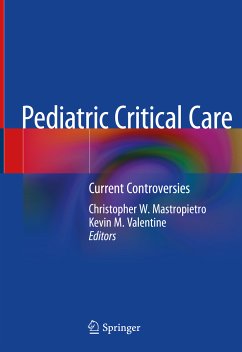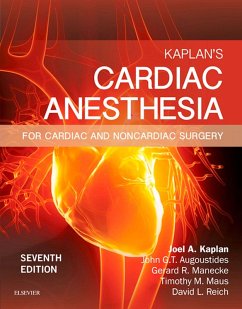
Fuhrman & Zimmerman's Pediatric Critical Care E-Book (eBook, ePUB)
Fuhrman & Zimmerman's Pediatric Critical Care E-Book
Versandkostenfrei!
Sofort per Download lieferbar
165,95 €
inkl. MwSt.
Weitere Ausgaben:

PAYBACK Punkte
83 °P sammeln!
In the highly specialized field of caring for children in the PICU, Fuhrman and Zimmerman's Pediatric Critical Care is the definitive reference for all members of the pediatric intensive care team. Drs. Jerry J. Zimmerman and Alexandre T. Rotta, along with an expert team of editors and contributors from around the world, have carefully updated the 6th Edition of this highly regarded text to bring you the most authoritative and useful information on today's pediatric critical care-everything from basic science to clinical applications. - Contains highly readable, concise chapters with hundreds ...
In the highly specialized field of caring for children in the PICU, Fuhrman and Zimmerman's Pediatric Critical Care is the definitive reference for all members of the pediatric intensive care team. Drs. Jerry J. Zimmerman and Alexandre T. Rotta, along with an expert team of editors and contributors from around the world, have carefully updated the 6th Edition of this highly regarded text to bring you the most authoritative and useful information on today's pediatric critical care-everything from basic science to clinical applications. - Contains highly readable, concise chapters with hundreds of useful photos, diagrams, algorithms, and clinical pearls. - Uses a clear, logical, organ-system approach that allows you to focus on the development, function, and treatment of a wide range of disease entities. - Features more international authors and expanded coverage of global topics including pandemics, sepsis treatment in underserved communities, specific global health concerns by region. - Covers current trends in sepsis-related mortality and acute care after sepsis, as well as new device applications for pediatric patients. - Provides ultrasound videos and more than 500 board-style review questions and answers on Expert Consult. - Enhanced eBook version included with purchase. Your enhanced eBook allows you to access all of the text, figures, and references from the book on a variety of devices.
Dieser Download kann aus rechtlichen Gründen nur mit Rechnungsadresse in A, B, BG, CY, CZ, D, DK, EW, E, FIN, F, GR, HR, H, IRL, I, LT, L, LR, M, NL, PL, P, R, S, SLO, SK ausgeliefert werden.













